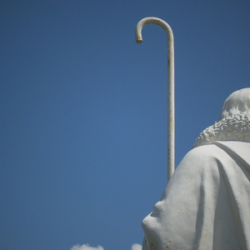Editor's Note: If you missed it the first time, see the first part of Dr. Roberts' "Master Class for Pastors."
Pastoring can be a lonely business. It's not just that pastors need to spend plenty of time by themselves, preparing sermons, praying, writing, planning, and thinking. What pastors do and how they are positioned in their churches often augments their feelings of aloneness. This is true even for senior pastors with large staffs and not just those we tend to call "solo pastors."
A few months ago, I wrote a series of columns for the Preachers' Portal on pastoral loneliness (Part 1, Part 2, Part 3, Part 4). These columns received more comments and more Facebook "likings" than anything I've written for this portal. Clearly, the issue of pastoral loneliness touches a nerve for many pastors.
We find a tantalizing challenge to pastoral loneliness—perhaps even an antidote—in the opening verse of the letter we know as 1 Thessalonians: "Paul, Silvanus, and Timothy, To the church of the Thessalonians in God the Father and the Lord Jesus Christ: Grace to you and peace." Almost all commentators assume that Paul was the main author of the letter, and that Silvanus and Timothy were mentioned mostly as window dressing. But this assumption misses some crucial points about the authorship of the letter and Paul's pastoral intentions.
First, here's a little data on Paul's apparent co-writers. Silvanus, who is called Silas in Acts, was a leading member of the church in Jerusalem who joined Paul on his second missionary journey. According to Acts, Silas accompanied Paul when he came to Thessalonica (17:1). He is mentioned several times as Paul's partner there (17:4, 5, 10). Paul refers to him as Silvanus, not only in 1 Thessalonians 1:1, but also in 2 Thessalonians 1:1 and in 2 Corinthians 1:19, where he is mentioned as one who proclaimed the gospel alongside Paul and Timothy.
Timothy was one of Paul's regular co-workers. Acts does not mention him as accompanying Paul and Silas in Thessalonica, though he shows up in the next town, Beroea, as if he had been with them all along (Acts 17:14). Whether Timothy had been with Paul and Silvanus in Thessalonica or not, the Thessalonian Christians knew him well because Paul sent him from Athens to Thessalonica in order to see how the Thessalonians were getting along (1 Thess. 3:1-2). Referring to this event in the third chapter of 1 Thessalonians, Paul describes Timothy as "our brother and co-worker for God in proclaiming the gospel of Christ" (3:2). Such a strong commendation of Timothy underscores his value to Paul in his apostolic work.
So, both Silvanus and Timothy were significant co-workers of Paul who shared in his ministry regularly and in profound ways. But does this mean they also shared with Paul in the writing of 1 Thessalonians?
We can't answer this question definitively, but we can note some unusual facts about 1 Thessalonians. Almost all the self-referential subjects and verbs of this letter are plural. "We" write to the Thessalonians, not "I." Twice in the letter, Paul speaks in the singular (2:18, 3:5). In both of these occasions, he wants to emphasize his emotional concern for the Thessalonians. This suggests that the plural "we" throughout the letter really does mean "we," not "I."
The extent to which Silvanus and Timothy contributed to the writing of 1 Thessalonians isn't the main point, however. What matters even more is the effort made by whoever wrote this letter to picture the authors as a unified team. Even if Paul was the main writer, as seems likely, he wanted the Thessalonians to understand that he, Silvanus, and Timothy were united in their pastoral care for the Thessalonians. Even as they preached and planted churches together, so they also pastored the churches they had planted together.
Now let's get back to the issue of pastoral loneliness with a simple question: Do you have your Silvanus and Timothy? To put it more literally: Do you have teammates who are sharing deeply with you in your ministry? Depending on your role in the church, these might be your staff, your colleagues, or significant lay leaders. Your teammates might also be other pastors in your community, if you regularly share life and ministry with them in a deep way.





